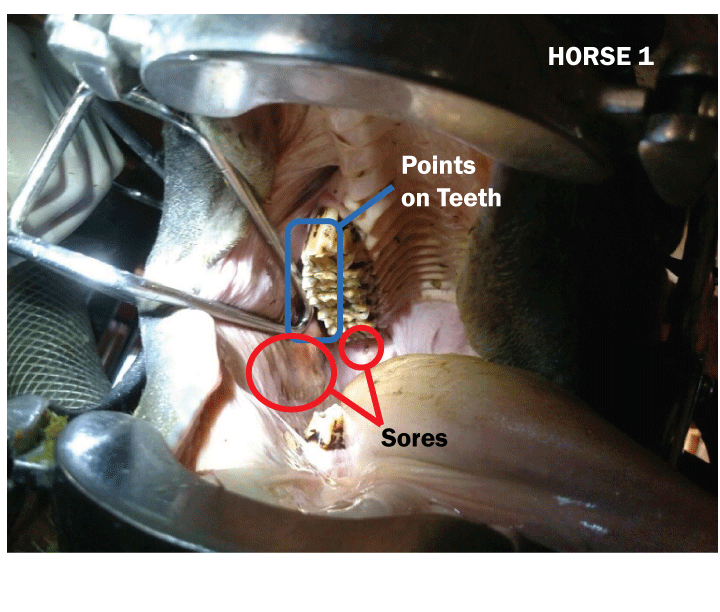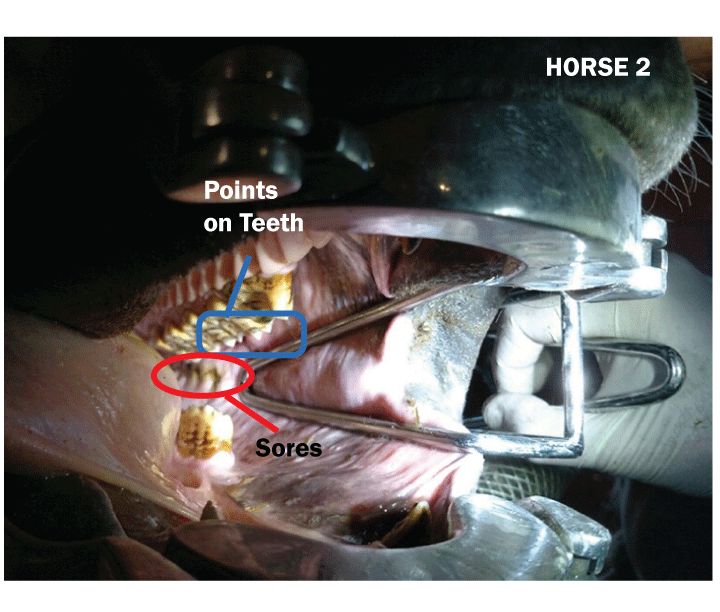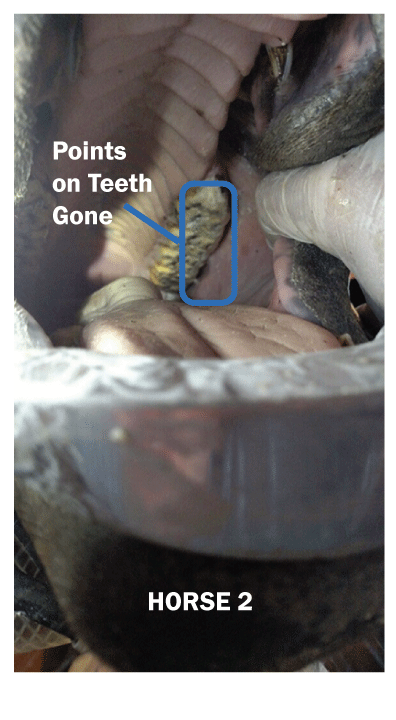By Tricia Bridgeo
I preemptively apologize to all the wonderful dentists out there but, show of hands, how many of us like going to the dentist? (I don’t see many hands shooting up.) Loud noises in our heads and weird (sometimes painful) sensations on our teeth or gums can make for anxious moments.
Nerves aside for the moment: as humans, we can take comfort in knowing one absolute truth – that when we visit a dentist, that person is a medical doctor. The same is not true in the equine world, where a “dentist” may not be a veterinarian and where “certification” criteria can vary widely. If you are not having a DVM working on your horse’s teeth, do you know what credentials the person does have?
One of the most significant differences between a Doctor of Veterinary Medicine who specializes in equine dentistry is the ability to use sedation. (Again show of hands, how many of us want teeth pulled, gums scaled, loud grinding noises without some form of medication?) Some horse “dentists” use the bold advertisement that they do not use sedation. Good thing, because they CANNOT by law.
As your horse’s advocate and caregiver, please research the person responsible for maintaining your horse’s mouth. The length of time it takes to properly align and file your horse’s teeth is not mere minutes. Could you calmly keep a speculum in your open mouth for 30 to 40 minutes while a dentist worked on your teeth?
The before photos below are pictures of horses mouths done by “dentists” – not vets. The owners truly felt they were giving proper care to their beloved pets. Sores ran along the whole sides of the horses’ mouths. Problems with bitting, behavioral issues while riding, and not maintaining weight led to a vet reviewing the dental care. The vet who worked on their mouths specializes in dentistry. He used a power float to smooth and align the teeth. The horses were sedated. One of the horses showed immediate improvement in moving more properly onto the bit and won a 3-phase event soon after.
Your horse can perform and live a longer life if they have a properly working mouth. Do your research, if your dentist is not a vet they CANNOT sedate – it is not a bragging point or indication of the quality of their “dentistry” skills.
If you have access to a vet specializing in equine dentistry, check them out and ask questions. If they use power floats, ask questions. If they sedate, ask questions. (Do you see a trend here?)
Remember, your dentist went to medical school and is a doctor for a reason – our horses’ mouths deserve the same expertise.
One final point – the cost you may save on a “dentist” is often much more costly in other ways: loss of weight, bad behavior, losing at shows and, most importantly, dangerous rides that could lead to injury.
Look at the pictures below for an idea of why horses’ teeth need to be looked after….
Here’s a picture of Horse 1 – note the sharp points on the teeth and resulting sores:
 Here are ‘before’ and ‘after’ shots of another horse:
Here are ‘before’ and ‘after’ shots of another horse:



Equine Dentistry: Choose What’s Right for Your Horse
By Tricia Bridgeo
I preemptively apologize to all the wonderful dentists out there but, show of hands, how many of us like going to the dentist? (I don’t see many hands shooting up.) Loud noises in our heads and weird (sometimes painful) sensations on our teeth or gums can make for anxious moments.
Nerves aside for the moment: as humans, we can take comfort in knowing one absolute truth – that when we visit a dentist, that person is a medical doctor. The same is not true in the equine world, where a “dentist” may not be a veterinarian and where “certification” criteria can vary widely. If you are not having a DVM working on your horse’s teeth, do you know what credentials the person does have?
One of the most significant differences between a Doctor of Veterinary Medicine who specializes in equine dentistry is the ability to use sedation. (Again show of hands, how many of us want teeth pulled, gums scaled, loud grinding noises without some form of medication?) Some horse “dentists” use the bold advertisement that they do not use sedation. Good thing, because they CANNOT by law.
As your horse’s advocate and caregiver, please research the person responsible for maintaining your horse’s mouth. The length of time it takes to properly align and file your horse’s teeth is not mere minutes. Could you calmly keep a speculum in your open mouth for 30 to 40 minutes while a dentist worked on your teeth?
The before photos below are pictures of horses mouths done by “dentists” – not vets. The owners truly felt they were giving proper care to their beloved pets. Sores ran along the whole sides of the horses’ mouths. Problems with bitting, behavioral issues while riding, and not maintaining weight led to a vet reviewing the dental care. The vet who worked on their mouths specializes in dentistry. He used a power float to smooth and align the teeth. The horses were sedated. One of the horses showed immediate improvement in moving more properly onto the bit and won a 3-phase event soon after.
Your horse can perform and live a longer life if they have a properly working mouth. Do your research, if your dentist is not a vet they CANNOT sedate – it is not a bragging point or indication of the quality of their “dentistry” skills.
If you have access to a vet specializing in equine dentistry, check them out and ask questions. If they use power floats, ask questions. If they sedate, ask questions. (Do you see a trend here?)
Remember, your dentist went to medical school and is a doctor for a reason – our horses’ mouths deserve the same expertise.
One final point – the cost you may save on a “dentist” is often much more costly in other ways: loss of weight, bad behavior, losing at shows and, most importantly, dangerous rides that could lead to injury.
Look at the pictures below for an idea of why horses’ teeth need to be looked after….
Here’s a picture of Horse 1 – note the sharp points on the teeth and resulting sores: